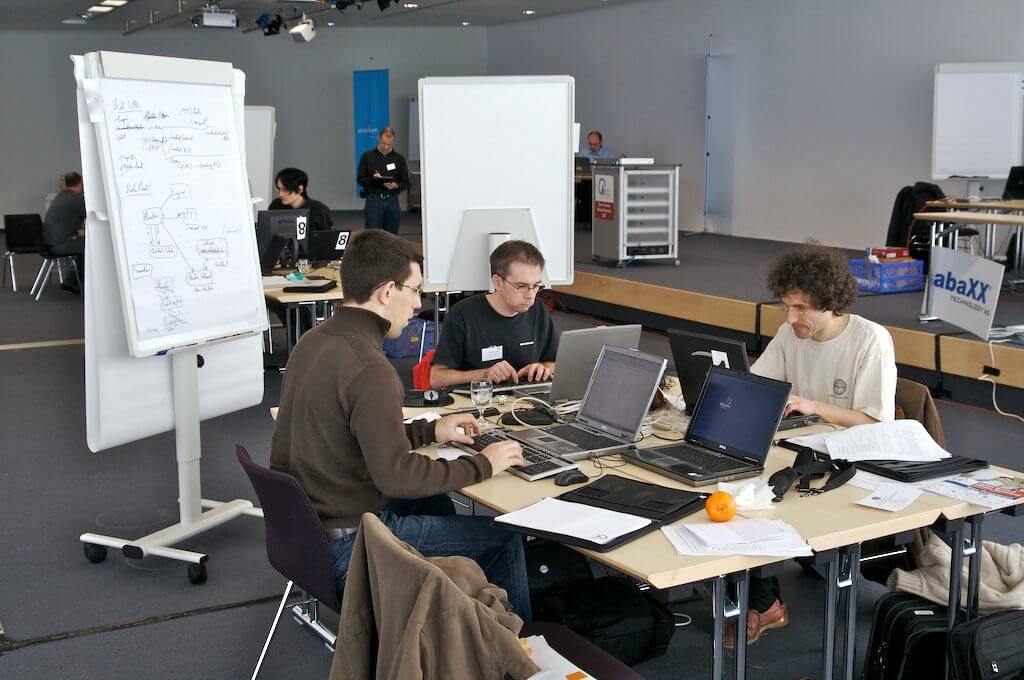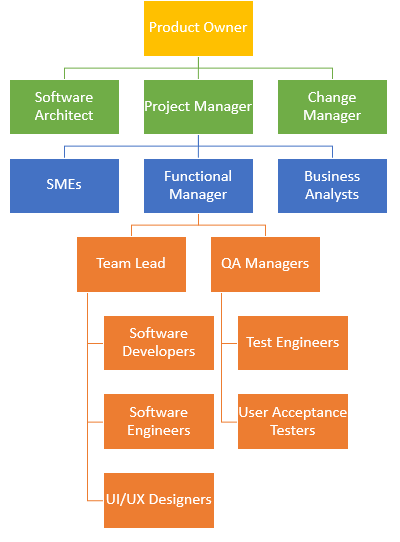For the success of a business, what matters the most is how efficient its team members are. In a time when the demand for various software solutions is on the rise, it is essential for every company to have a productive software development team. The more skilled your team is, the better and quicker it executes projects.
Nonetheless, you cannot just randomly set up a productive team. The most successful software development teams are well-organized. They have members who know and understand their respective duties. They are in sync with each other and work together towards achieving the set goals. Of course, building such a team requires you to carefully consider team members, distribute duties, and ensure effective collaboration.
Although hiring dedicated development teams has become a reliable and quick way of completing software projects for companies across industries, some prefer to have in-house capacity. If you company is in that group, this comprehensive guide will explain to you how to set up a successful software development team.
Table of Contents
- Software development team structure
- Team roles and responsibilities
- Development team hierarchy
- What goals a software development team should achieve
- What factors might be considered when selecting people for a software development team?
- Typical team size
- Things to consider when choosing a software development organization
- Summary
Software Development Team Structure
The first step to building a team is choosing a team structure. Here are the three most common team structure types. Your choice will depend on the nature of your projects.

Generalists
A generalist team includes people with a vast knowledge base and a wide-ranging skillset. Members of such teams use various resources and leverage their skills to tackle a wide variety of tasks. They also have good communication skills and are usually keen on lifelong learning. When it comes to software projects, companies usually hire full-stack developers to build a generalist team.
Specialists
As the term implies, a specialist team structure includes members with experience in solving particular challenges and working with particular tools. These members are adept at one skill set or methodology and can utilize their expertise to solve complex problems. Having specialists in a team is important to address a specific part of software development, for example develop or fix an augmented reality (AR) feature. Likewise, you would need manual quality assurance (QA) experts or QA automation engineers to cover the testing stage of your software development lifecycle.
Hybrid
A hybrid software team is comprised of both generalists and specialists. Such teams usually thrive in managing a wide array of projects that address different areas or issues at once. Hybrid teams not only fix specific problems in a project efficiently but also address other areas when needed.
Software Development Team Roles And Responsibilities
Evidently, software engineers to the biggest chunk of work on any project. Still, a software development team has many other roles that are not connected to coding. Let’s look at all the types of experts every successful software development should have. The list is not set in stone, and my change depending on the project.
Product Owner
A product owner represents the actual buyer of the product that is being developed. Hence, this job role also becomes a part of the development team, as product owners decide on the product requirements and ensure the team follows the established vision for the project.
Project Manager
A project manager guides the team throughout the software development lifecycle and ensure the final product is delivered on time and corresponds with the initial vision. A project manager not only manages the execution of a project, but also serves as a bridge between the technical staff, all the stakeholders, and the client.

Project managers are responsible for creating the entire project execution plan by setting up deadlines, delegating jobs to team members, recruiting more team members (if required), and so on.
Functional Manager
A functional manager serves as an intermediary between the project manager and team members. This job role requires overseeing the work progress of a project and ensures effective execution. Project manager often take on the responsibilities of a functional managers to streamline the software development.
Business Analyst
In essence, business analysts translate the client’s requirements to technical requirements for the team. A business analyst also elaborates on the project requirements and verifies whether the deliverables correspond to them.
Team Lead
A team lead oversees and steers development teams toward a successful final result, that is a high-quality software product. This role connects developers, project managers, and the client’s stakeholders. Moreover, a team lead verifies whether the deliverables comply with the requirements.
Software Architect
This job requires a proficient individual who oversees the technical side of a software solution that is being developed and helps the team tackle technical issues that arise in the software development lifecycle.
Software Developers and Engineers

Software engineers, for example front-end and back-end developers, are responsible for the technical execution of the project. They bring the deliverables to life according to the set requirements and communicate the details to their team lead and project manager.
UI/UX Designers
UX and UI Designers are responsible for bringing the software to life by researching the demands of the target audience, interviewing the users about their requirements, and gathering other data. They then work together to design an interface and user experience that will be engaging for users.
Change Manager
Change managers decide on whether to accept or reject the changes that are proposed for a software product. Change managers may also be responsible for budget, timelines, and some project requirements. Typically, there are several change managers involved in the project.
Quality Assurance (QA) Manager
A QA Manager tests a product for whether a software solution works properly and follows the client’s requirements.
Test Engineer
The Test Engineer is responsible for creating and running test scripts to detect bugs and ensuring that the set deliverables match the requirements.
User Acceptance Testers
User acceptance testers (UATs) are responsible for executing the final step of the project before delivery. These testers review the product quality from the users’ perspective. User acceptance testers may delay the final release, if they find any substantial issues.
Subject Matter Expert (SME)
A software development team may also include subject matter experts who lend their expertise to specific areas of development when required.
Development Team Hierarchy
Here is the visualization of a typical hierarchy for a development team:

What Are Software Development Team Goals?
The main goal of any software development team is to deliver a well-built product on time. As plain as it sounds, achieving this is always challenging: numerous factors are at play in every project, and simply put, creating a great software product requires a lot of effort from all involved individual.
Here the most common goals on the road to solid software.
Usability
First and foremost, any software should deliver on its promise, that is help users solve a specific task quickly and easily. As many apps are used daily, a software development team should also make their product visually appealing to users.
Functionality
Every feature should fulfill its purpose and work properly in a software product. There should be no redundant elements in the functionality. To ensure this, every development team should carry out a comprehensive user survey before starting with design. Performing comprehensive testing is also very important to ensure a successful release and continuous operation after it.
Security
Considering that cyber attacks, hacks, identity theft, data leaks, and other digital security threats are the new normal in our digital lives, security should be a topmost concern for each and every software product. It means that the product should have no bugs and other vulnerable spots that can make the software product susceptible to malevolent activities. As a result, the security measures should be considered on the stage of designing the architecture and ensured by rigorous testing.
Time to Market
A development team should also ensure timely delivery of the final product to users. It means all team members should work efficiently from start to finish.
Reusability
Any software development team should aim at creating as much reusable code as possible to simplify future updates, big or small. Plus, reusing code means lower development costs.
What Factors Might Be Considered When Selecting People For A Software Development Team?
The success of a software development team depends on its members. Therefore, you need to consider numerous factors when building a team for your project.
Communication
Effective communication is key to the success of a software project. Regardless of how skilled the team members are, they will deliver the needed results if they do not communicate with each other efficiently.
Therefore, when you hire people for a team, make sure they have solid communication skills and are predispositioned to teamwork. Good communication means a productive and friendly working environment and ensures high productivity.
Ownership
A good team member is a responsible team member. Every individual in a teams should know their duties, project’s aim, time frames, and so on. Trustworthy team members recognize the importance of a project to the client, the users, and themselves, and understand they play an important part in the team.
Software Engineering Team Size
Another major factor impacting the recruitment process for software development projects is the team size, which, in turn, depends on the project. In most cases, small teams prove to be more productive as compared to larger ones. These teams have better communication and cooperation in general. A team of ten can be highly effective. Larger projects require highly skilled and experienced project and delivery managers to carry a project to a successful end result.
Development Team Management
Lastly, having a technical team lead or solution architect adept at developing software is also essential for a team’s success. Besides experience, the leader should also have management skills to lead the members to the desired outcome.
Things To Consider When Choosing A Software Development Organization
Hiring a software development organization like Intellectsoft to complete your projects has a wide array of benefits. You get a quickly assembled team, niche expertise, clear development process, ability to scale the team up and down quickly. Most importantly, you can significantly cut costs and build a big product within a short time frame.

Yet, before hiring a company, keep the following things in mind.
- Location. You can hire a local company, a company in a nearby country, or outsource from a faraway country. Outsourcing companies provide different engagement models and are highly flexible today. For example, developers can come to your office to conduct face-to-face meetings and work on-site, and then come back home for development. Conversely, many companies offer the option for the client to come and work with the team at their office.
- Technology Stack. It is important to know whether the engineers of the company you would hire from have the right skills to complete your project.
- Client Reviews. See what your potential partner’s clients have to say about their work, as well as look through their case studies.
- Industry Experience. Seek out companies with at least five years of experience for small projects, and at least eight for medium and large projects.
Wrapping It All Up
A successful software development team can ensure a solid end product and greatly benefit your business. Such teams include experienced and efficient members who have the right skills and can work as a team.
Setting a software development teams requires carefully selecting its team members, or choosing a fitting software development outsourcing provider. Whether you build your own team or hire from such a company, make sure that the selected individuals meet your needs. Having a successful team not only benefits a certain project, but can positively impact your future updates and projects. All you need to do is be selective during the hiring process, monitor the progress at times, provide feedback, and appreciate small achievements.